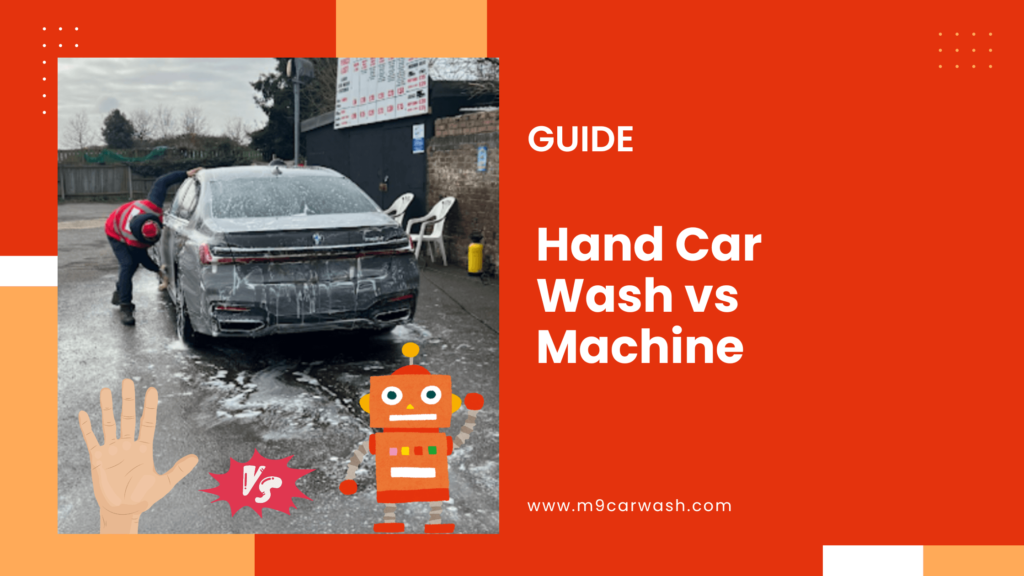For thoroughness and care, hand washing is superior, especially for high-end vehicles. However, if convenience and time are priorities, machine washes are a practical option. A hybrid approach—using both methods—can offer the best results for vehicle maintenance.

Hand Car Wash
- Pros: Offers better cleaning, customization, and attention to detail. Ideal for delicate surfaces and stubborn dirt.
- Cons: Time-consuming, labor-intensive, and may use more water.
Machine Car Wash
- Pros: Quick, efficient, and often less expensive. Automated systems can provide a uniform clean.
- Cons: Potential for scratches from brushes, may not remove tough grime effectively, and could lead to water spots.
Hand Car Wash
When I think about hand washing my car, it’s all about the level of care and detail I can give. There are many reasons to choose hand washing over automatic methods.
I appreciate how it can be both thorough and gentle on my car’s paint. It’s important to weigh the benefits and drawbacks before deciding.
Benefits of Hand Washing
Hand washing offers several advantages that stand out. One major benefit is attention to detail. I can focus on hard-to-reach areas like wheel wells and under the mirrors. This precision makes sure every corner gets cleaned.
Using gentle soaps and tools, such as a wash mitt, helps avoid scratches or swirl marks on the surface.
I also control how much water I use, which is typically lower than in automatic washes. The drying process is another plus; I use soft, clean towels that prevent water spotting.
A hand wash can be cost-effective, especially if I do it myself. I can customize the cleaning products I want, making it feel more personal.
The effort I put into hand washing can lead to a thorough clean that I might not achieve otherwise.
Drawbacks of Hand Washing
While hand washing has its benefits, there are a few drawbacks to consider. One is that it can be time-consuming. Spending an hour or more to wash and dry my car requires planning and commitment.
I also need to be careful with my tools and products. Using the wrong cleaning products can lead to potential damage. Not every car owner has the right experience or knowledge to achieve a perfect finish. If I’m not careful, I risk scratching my car during the process.
If I don’t wash my car regularly, dirt can build up, making the job harder. Sometimes, it’s tempting to skip areas, which could lead to a less thorough clean. Despite these drawbacks, I often find it worth the effort for that satisfying, clean car feeling.
Machine Car Wash Systems
Machine car wash systems provide fast and convenient ways to clean vehicles. These systems include automatic and touchless options, each with its own advantages and drawbacks.
Pros and Cons of Automatic Car Washes
Pros:
- Efficiency: These systems can clean a car in just a few minutes. For busy people, this is a huge benefit.
- Cost-Effective: Many car wash facilities offer affordable packages. This can be a budget-friendly choice compared to hand washing.
- Consistency: Automatic washes follow the same procedure every time, ensuring a uniform clean.
Cons:
- Potential Damage: Automatic washes with brushes can scratch the car’s finish if not maintained well.
- Water Spots: Depending on the drying method, water spots may still appear.
- Limited Customization: You can’t control how much soap or wax is used, which can affect the cleaning process.
Touchless vs. Automated Brush-Based Systems
Touchless systems use high-pressure water and detergents to clean without physical contact. This reduces the risk of scratches, making it a safer option for delicate finishes. However, they might not remove tough dirt as effectively as bristle brushes.
Brush-based systems utilize rotating brushes to provide thorough cleaning. They can be more effective in removing grime, but the brushes can wear down paint over time. It’s essential to choose a well-maintained facility to minimize this risk.
When considering your options, I find it crucial to weigh the pros and cons against your personal preferences and vehicle needs.
Each type of machine car wash caters to different situations, so understanding both systems helps in making an informed decision.
Comparative Analysis: Manual vs Machine Washing
When it comes to car washing, both manual and machine methods have distinct benefits and downsides. I’ll explore how costs, personal views, and environmental factors influence the choice between the two.
Cost-Benefit Evaluation
I find that cost is a big factor for many car owners. Hand washing usually saves money on labor, especially if you do it yourself.
Basic supplies like soap, buckets, and microfiber cloths can be around $20 to $50. On the other hand, automatic car washes may charge anywhere from $10 to $30 per visit and can add up quickly if you clean your car often.
When considering value, hand washing can also provide a thorough clean. Yet, automatic washes are quick and offer different packages, from basic to detailing. Balancing convenience with price is important.
For those on a budget, hand washing is often the better option in the long run, while automatic washes suit busy schedules.
Car Owners’ Perspectives
Personal preferences influence many car owners’ choices. Some people enjoy the hands-on experience and take pride in their work. For them, hand washing offers a chance to bond with their vehicle. It also allows for a more detailed clean in hard-to-reach places.
In contrast, I’ve spoken to others who prefer the convenience of an automatic car wash. These owners often value efficiency over personal touch.
They appreciate the quick service and don’t mind spending money on something that saves them time. The automatic wash may also offer the assurance of consistent results, which some find appealing.
Environmental Implications
Environmental concerns related to car washing are also important. Hand washing can waste water if not done properly, but it allows for the use of eco-friendly products. I often choose biodegradable soap to minimize my impact.
Automatic car washes generally recycle their water and may use fewer harmful chemicals. However, they consume significant amounts of water and energy. Making a conscious choice about which method to use can align with my values regarding environmental impact.
Balancing environmental considerations with convenience and cost can help each car owner find the best solution for their washing routine.
Frequently Asked Questions
What are the pros and cons of hand car wash vs machine car wash?
Hand car washes offer the advantage of thorough cleaning, especially in hard-to-reach areas. They allow for more control over the cleaning process and reduce the risk of scratching the paint. On the downside, they take more time compared to automatic washes.
Automatic car washes are quick and convenient. They get the job done in minutes, which is perfect for busy schedules. However, they may not clean as thoroughly and can sometimes cause scratches if the equipment is not well maintained.
How does the cost compare between a hand car wash and an automatic car wash?
The cost of hand washing a car often ranges from $10 to $50, depending on the services included. This includes detailed care like waxing or interior cleaning. In contrast, automatic car washes typically charge between $5 and $20 per wash depending on the level of service chosen.
While automatic washes may seem cheaper in the short term, frequent visits can add up over time.
What are the differences in effectiveness between hand washing and automatic car washing?
Hand washing tends to be more effective at removing dirt and grime because it allows for detailed attention to each part of the vehicle. I can focus on areas that machines may miss, like wheel wells and door jambs.
Automatic washes are designed for speed, which sometimes means they can miss finer spots. The effectiveness also depends on the quality of the machine and the type of wash selected.
Are there any risks to paintwork from using machine car washes instead of hand washes?
Yes, there are risks associated with automatic car washes. If the brushes or equipment are not well maintained, they can cause scratches or swirl marks on the paint. It’s important to choose a high-quality wash to minimize these risks.
In addition, older machines with brushes are known for causing more damage than newer touchless models, which rely on high-pressure water and soap.
Can a touchless car wash achieve the same results as a hand wash?
Touchless car washes can be less abrasive on the paint, using sprays instead of brushes. They can effectively remove dirt without the risk of scratching. However, they may not provide the same level of detail as hand washing, especially for stubborn grime.
Thus, while touchless washes are gentler, they might not offer as thorough a clean as I could achieve through hand washing.
What factors should be considered when choosing between a hand car wash and a machine car wash?
When deciding, consider your budget, time, and how dirty your vehicle is. If I have limited time, an automatic wash might be the best choice. For a detailed clean, especially after a long trip, hand washing is usually more effective.
You should also think about your car’s paint condition. If it’s older or has already been scratched, hand washing might be the safer option.






